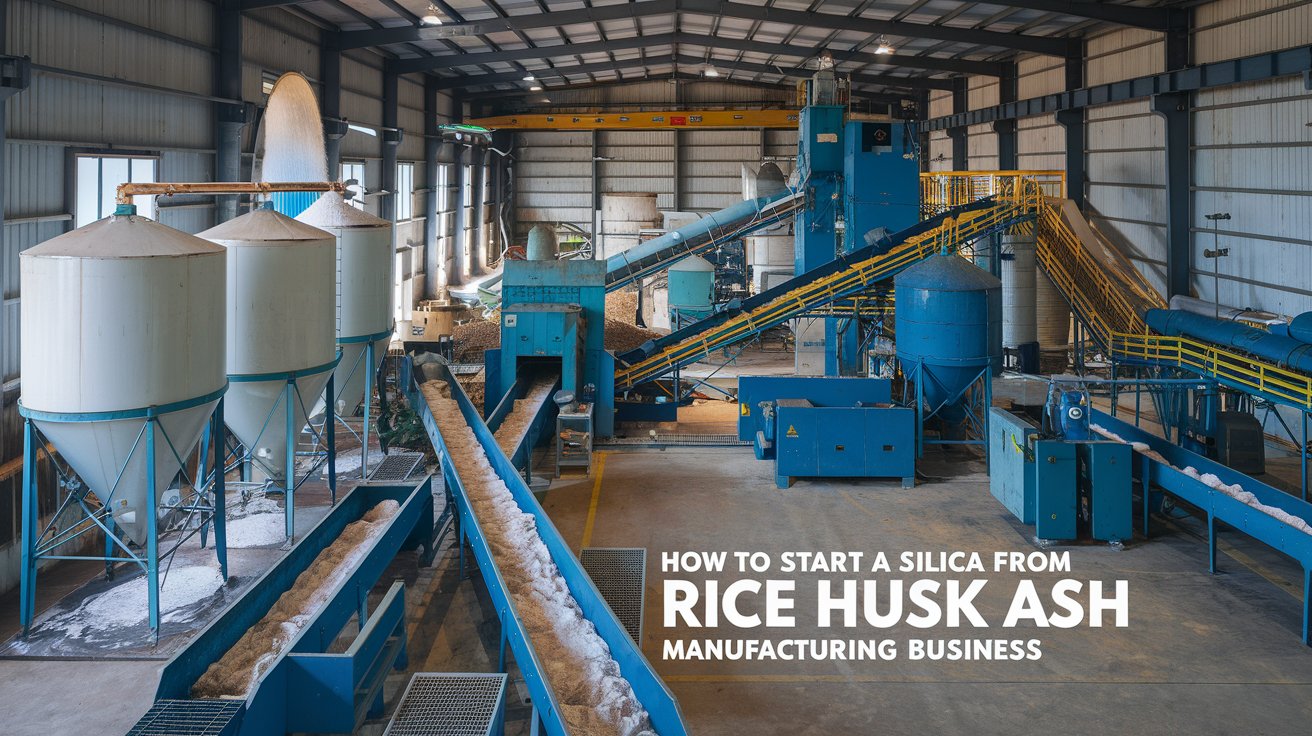Silica is also one of the most common raw materials utilized in many industries, such as rubber, paint, ceramics and concrete production, among others. Some other production methods of producing silica, that are not as friendly to the environment, as well as expensive, is growing trees for it. This ash therefore contains a significant percentage of amorphous silica, thus allowing its easy processing to produce silica. Starting a silica business globally with rice husk ash as the raw material is apparently a profitable business. This increased demand for silica and its derivatives meaningfully increases the demands placed on rice husk by-products. This article describes the method of dissolving powdered ash in hydrochloric acid, filtering the solution, and drying
this solid. It gives some hints on starting silica-from-rice-husk-ash businesses. An understanding of the raw materials, manufacture, and market will always position one for success in this small but manageable journey over the long term. The follow up essentials will help to succeed in this silica production business.
What is Silica from Rice Husk Ash?
Rice husk ash (RHA) is one of the waste byproducts of rice husks. During the incineration process, these mills let off silica while processing their rice grains. The ash that one gets from burning rice husk in controlled conditions would contain an abundant percentage of silica. This ash harbors very valuable amorphous silica. Experts know that this silica can be easily refined into pure silicon dioxide. Industries source the purified silica for use in rubber intermediates, ceramics, construction, and other sectors. Moreover, using rice husk ash as a raw material enhances the manufacturing process.
Why Start a Silica Manufacturing Business from Rice Husk Ash?
- Environmental issues: Rice husk ash can be used for producing silica which assists in an eco-friendly solution. The rice husk tends to be problematic for disposal if not treated and silica in this case proves to be impactful.
- Demands: Demand for silica is increasing as it is one of the most suitable materials that is used in many industries such as electronics and construction glass industries.
- Consistent Source: Rice is one of the most cultivated food types worldwide which also guarantees the availability of rice husk ash, which, thus, is an ideal and inexpensive source of raw material in the process of recovering silica.
- Economical Production: Rice husk ash is cheap because in most instances, it is waste material. It is simple to put up on a scale of operations for silica extraction, and the processes involved are not complex.
- Market Potential: Silica is a transformer commodity which encourages export and international business activity.
Join Us : https://npcsblog.com/
Key Applications of Silica
- Rubber: The incorporation of silica as a filler in rubber improves its durability and strength.
- Construction: Manufacturers add silica to concrete to improve strength and decrease its permeability.
- Paint and Coatings: Formulators incorporate high-quality silica into coatings and paint formulations to enhance certain surface properties.
- Ceramics: Industry professionals widely utilize silica for producing ceramic items.
- Glass Manufacturing: One of the most important raw materials that constitutes the composition of glass is Silica.
Production Methods for Silica from Rice Husk Ash
There are a number of important stages in the work of silica extraction from rice husk ash.
- Collection of Raw Material: Ensuring an uninterrupted supply of rice husk ash that can be obtained from rice mills or power plants that incinerate rice husks as waste.
- Cleaning of Aged Rice Husk Ash: Impurities like carbon content and uncharred husk waste remaining in the ash are carried out with the help of cleaning techniques such as washing followed by burning at controlled short distances.
- Silica Extraction: Rice husk ash which has been purified is treated with either sodium hydroxide or hydrochloric acid in order to draw out silica in the form of either sodium silicate or silicon dioxide.
- Filtration and Precipitation: The silica which is referred to is into solution, unwanted materials are filtered before the silica is cut out from the solution.
- Drying and Packaging: Post precipitation, the silica is dried out to eliminate any remaining moisture, packed and kept in storage or transported for further processing.
Related Articles: https://www.entrepreneurindia.co/page/business-opportunities-in-india/
https://entrepreneurblog.in/category/blog/
Machinery Required for Silica Manufacturing
Investment in silica-from-rice-husk-ash manufacturing business calls for more advanced equipment to boost production capacity. The fundamental equipment comprises the following.
- Burning Furnaces: The equipment is utilized for the controlled combustion of rice husks for the purpose of ash production with high silica content.
- Reaction Vessels: These are used for chemical treatment of the ash, where acid or alkali solutions fill the tank and the rice husk ash is treated in order to recover silica from the ash.
- Filtration Systems: This system enhances the removal of residues and control of the separation of silica from the other products formed in the reaction.
- Drying Systems: These systems minimize the moisture content level in the extracted silica to ensure that the product meets the required quality and is fit for packaging.
- Storage Tanks: They serve as tanks for storing both raw materials and finished products.
Steps to Start Your Silica Manufacturing Business
Market Issues:
Carry out an extensive analysis on the market for silica in the various industries of rubber, construction, glass, as well as, identifying possible clients and analyzing the market competition.
Formulate a Business Plan:
In order to attract investment and purpose in running the business, one has to come up with a correctly thought out business proposal. This will involve analyzing the market, the production processes, the finances involved and the marketing strategies.
Comply with Requirements for Permits:
Production of silica is available with the handling of its byproducts and chemicals carefully. This process can bear the risks of damaging the environment if mishandled. Acquire the necessary permission from the competent authorities within the country. Adhere at all times to the applicable environmental and health safety regulations without fail. Provide all preventive measures against all environmental or health hazards.
Establish Hardware:
Build a plant that has the right equipment for the extensive mining of silica. Ensure that your plant is also built in accordance with all the health and environmental laws.
Obtaining the Availability of the Input Material:
It is advisable to engage rice husk ash suppliers such as rice mills or biomass plants in order to develop a sustainable supply of rice husk ash. A constant supply of the raw materials will guarantee a smooth running of the production process.
Assurance of Quality:
Maintain strict quality assurance techniques within the process so that the end product silica extracted does not fall short of the market requirements. Outcomes of your product will also be dependent on the timely testing and surveillance of your product.
Marketing and Sales:
Work towards getting clients in the areas of rubbed glass construction, etc. In addition, market yourself in business shows with potential customers in the industry and do proper marketing on the internet to get customers’ attention.
Research and Development:
Channel funds to research and development programs in order to enhance the effectiveness of your production processes and seek for alternative uses of your silica products. The ability to innovate is particularly important towards the sustaining of a company’s competitive advantage in business.
Conclusion
Strategic, of which silica production from rice husk ash is one kind. This business will fit those who want to venture into the chemical industry. Silica has a wide variety of uses and increasing demand in the global market. Rice husk ash, an environmentally friendly and sustainable raw material. This makes the business enormously profitable and ecologically beneficial. Regulatory compliance assures quality and operational sustainability over time. Innovative introductions of products are ways of keeping a loyal customer base. There will be expansion of market because of the increasing demand for green products. Most appropriate measures and quality control guarantee the business long-term growth. This sector is characterized by great potential for success in eco-friendly entrepreneurship.




